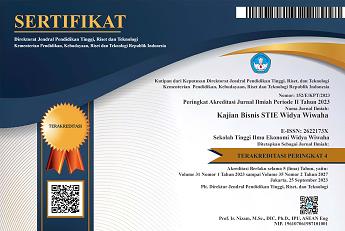Studi Komparasi Kinerja Kasir dan Juru Buku KSP KSPPS di Daerah Istimewa Yogyakarta Sebelum dan Sesudah Lulus Diklat Kompetensi
DOI:
https://doi.org/10.32477/jkb.v31i1.585Keywords:
Comparative, Cashiers, Bookings, Performance, CompetenceAbstract
The objectives of this study are: (1) comparing the performance of the KSP/KSPPS cashier before and after passing the competency test, so that it is known whether after passing the competency test the performance increases. (2) Comparing the performance of the KSP/KSPPS bookman before and after passing the competency test, so that it is known whether after passing the performance competency test increased.The research to be conducted is a comparative quantitative research. In this study a comparison of the performance of the cashier and KSP and KSPPS bookkeepers before and after graduating from the Competency Test. Data collected includes: (1) cashier performance data before passing the competency test, (2) cashier performance data after passing the Competency Test. (3) Book -up performance data before passing the competency test (4) Book -up performance data after graduating from the Competency Test. The data collection methods carried out are documentation and questionnaires. Documents in the form of reports of RAT 2 years before passing the Competency Test and 2 years after the Competency Test. The distribution of the questionnaire was carried out on the cashier and the bookman who was selected as a sample. Sampling by purposive random sampling with the number of samples in accordance with the formula Rao (1996).The results showed that after being assessed with 7 (seven) performance indicators namely: making work plans, accuracy at work, achieving work targets, delivery of work reports, work discipline, work cooperation, and service performance, both cashiers and bookkeepers are proven to have increased Performance after they follow the training and competency test compared to before.The limitation of this research is that in digging data only using Google Forms that are distributed to several social media groups and also individual KSP/KSPPS management and also interviews with online samples so that the samples cannot be many. While the recommendations that can be given for future research are so that more research samples can be added, and the research area can be expanded.
References
Anwar Prabu Mangkunegara. (2008). Manajemen Sumber Daya Manusia Perusahaan, PT Remaja Rosdakarya, Bandung
Echols, John M dan Hassan Shadily. (2000). Kamus Inggris Indonesia an English-Indonesia Dictionary. Jakarta: PT. Gramedia
Garcia-Barbero, M. (1998). How to Develop Educational Programmes for Health Professionals, Copenhagen: WHO Regional Office for Europe
Hariandja, Marihat Tua Efendi. (2002). Manajemen Sumber Daya Manusia. Jakarta: Grasindo.
Keputusan Menteri Tenaga Kerja dan Transmigrasi No KEP.133/MEN/III/2007, tentang Penetapan Standar Kompetensi Kerja Nasional Indonesia Sektor Keuangan Sub SektorPerantara Keuangan Bidang Koperasi Jasa Keuangan.
Kemenaker. (2009). Pedoman Pelatihan Berbasis Kompetensi Sektor Keuangan, Sub Sektor Perantara Keuangan, Jakarta: LSP-KJK.
Prawirosentono, S. (1999). Manajemen Sumber Daya Manusia, “Kebijakan Kinerja Karyawan” Kiat Membangun Organisasi Kompetitif Menjelang Perdagangan Bebas Dunia, Edisi Pertama, Yogyakarta: BPFE.
Pfeffer, J. (2003). Managing wth power: Politics and influence in organizations, Boston: Harvard Business School Press
Rao, Purba. (1996). Measuring Consumer Perceptions Through Factor Analysis. The Asian Manager, Feb-March.
Sedarmayanti, (2009), Sumber Daya Manusia dan Produktivitas Kerja, Bandung: Penerbit Mandar Maju.
Sugiyono. (2017). Metode Penelitian Kuantitatif, Kualitatif, dan R&D. Bandung: Alfabeta.
Trisnawati Estralita dan Agies Sukrisno. (2009). Akuntansi Perpajakan, ed 2, Jakarta Selatan: Penerbit Salemba Empat.
UU No 12 Tahun 1992 tentang Perkoperasian.
UU No 13 tahun 2003 tentang Ketenagakerjaan
Wibowo. (2007). Manajemen Kinerja. Jakarta: Raja Grafindo Persada
Downloads
Published
How to Cite
Issue
Section
License
Copyright (c) 2023 Suhartono, Achmad Tjahjono, Wahyu Purwanto

This work is licensed under a Creative Commons Attribution-ShareAlike 4.0 International License.









